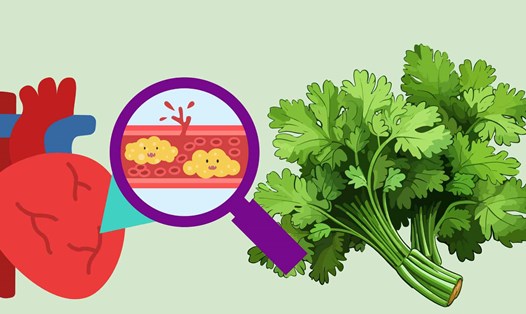Coriander, a familiar vegetable that brings great health benefits
Coriander (scientific name Coriandrum sativum) belongs to the Chinese family of coriander, commonly used in both Asia and the West. In addition to its role as a spice, many studies show that coriander also contains biological compounds that help protect cells, support the heart and reduce anxiety.
According to nutritionist Brittany Lubeck, Master of Nutritional Sciences, US Institute of Nutritional Application, coriander is an antioxidant drug that can fight free radicals, the cause of cell damage and inflammation in the body. She added that the active ingredient flavonoids in coriander leaves have the ability to inhibit the enzyme converted angiotensin (ACE), helping to dilate blood vessels and may lower blood pressure.
However, Ms. Lubeck also noted that most of the current studies are at the experimental level in rooms and in animals, and additional clinical evidence is needed to confirm its effects on humans.
In addition, some other studies have found that coriander can regulate brain activity, helping to reduce feelings of anxiety. The ingredient linalool, a characteristic fragrance in coriander, is said to have a central nervous system soothing effect, supporting relaxation and better sleep.
Skin beauty and safe uses
According to Elizabeth Barnes, a clinical nutritionist in the US, coriander also benefits the skin thanks to its ability to stimulate collagen production. Scented vegetable extract helps increase the synthesis of procollagen type 1, a precursor to collagen, while reducing the harmful effects of sunlight on the skin, says Barnes. Some studies have also shown that coriander essential oils can prevent enzymes that cause premature aging due to UV rays.
To take advantage of the benefits of coriander, experts recommend using flexibility in the diet: using nuts or fresh leaves to season dishes, sprinkle on salads, smoothies or soups to increase natural flavor. Dried coriander should be stored in a cool, dry place, while fresh coriander should be kept in a sealed container or plastic bag in the refrigerator.
Although generally safe, people who are taking antihypertensive drugs, hypoglycemic drugs or sedatives should be cautious when using them, because coriander can increase the effectiveness of the drug. People with a history of allergies to the Chinese leafy tea family (such as fennel, parsley) should also avoid it.
From a rustic spice, coriander is receiving scientific attention thanks to its potential health benefits. Although more research is needed, including coriander in your daily meals is a natural way to enhance flavor and support overall health.










